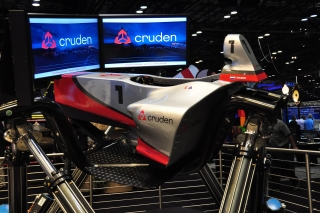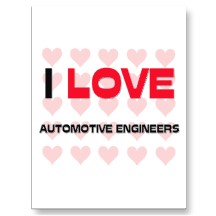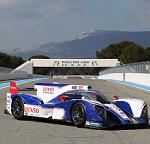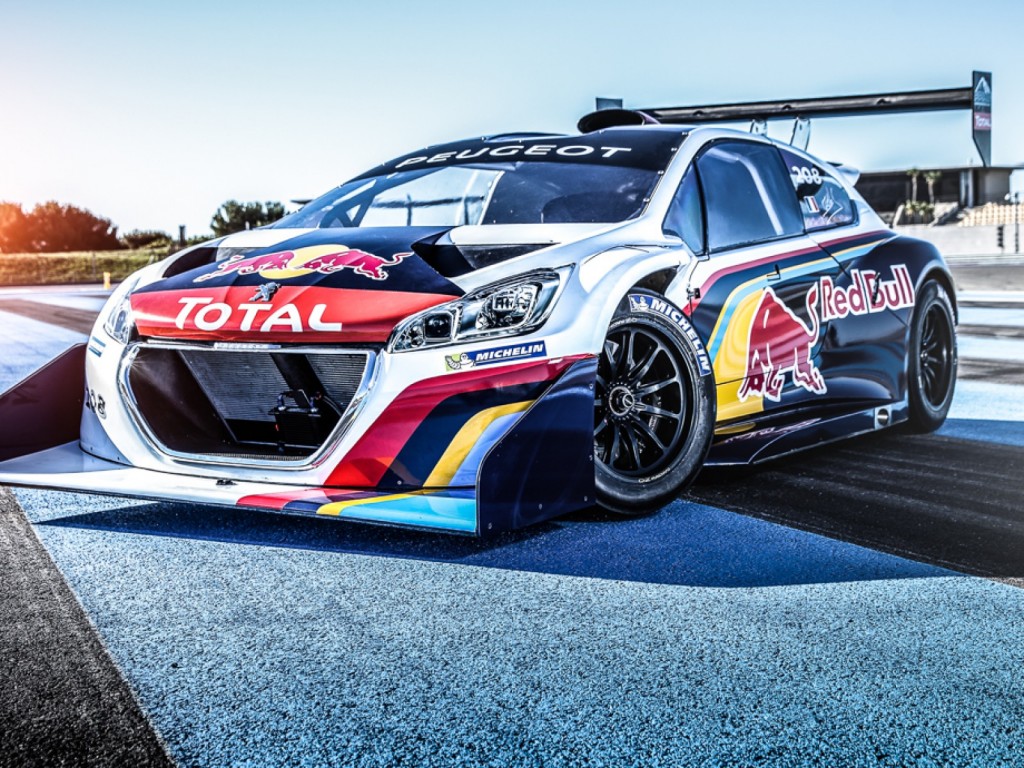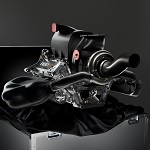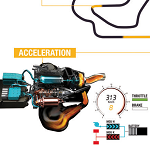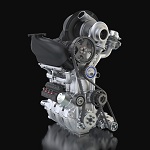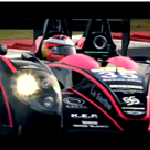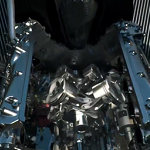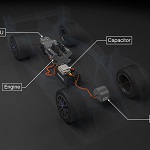Have you ever thought about upgrading to a titanium exhaust system? Lots of motorsport enthusiasts have. But is it worth the investment? That’s what we’re here to find out!
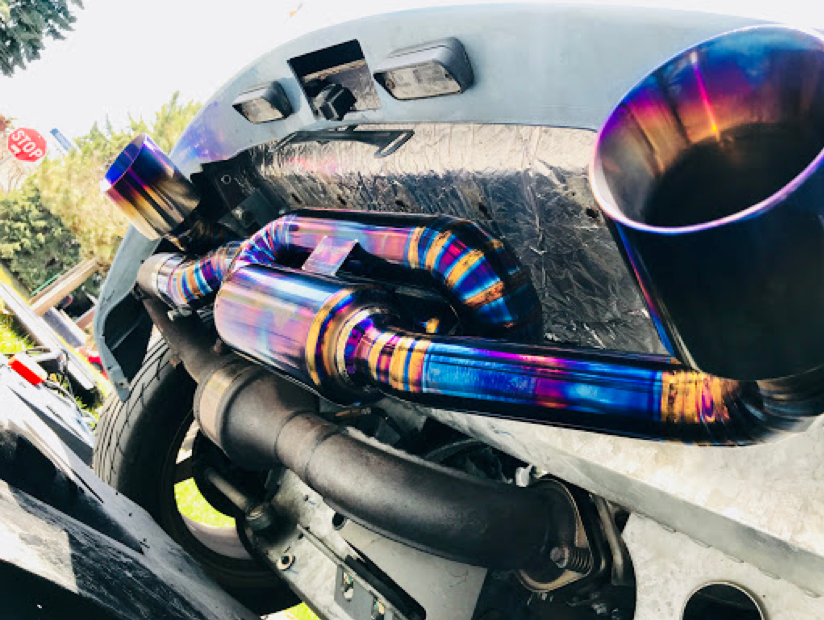
Check prices on eBay Motors
A titanium exhaust system installed in a Lotus Elise. The eye-popping colors immediately set titanium exhausts tubing and tips apart from comparable stainless-steel components. Source: Millionaire Racing.
Titanium exhaust systems are typically several times more expensive than traditional stainless-steel exhausts. However, they offer a number of notable improvements to both the performance and the aesthetics of sports cars. They are lighter, more durable, improve a car’s overall handling and performance, and (let’s be honest) look really cool. This article goes over the key differences between titanium and steel exhausts and helps you decide if the benefits are worth the splurge.
CLICK HERE FOR A VIDEO CONSIDERING THE PRICE AND VALUE OF TITANIUM EXHAUST SYSTEMS
Titanium Explained
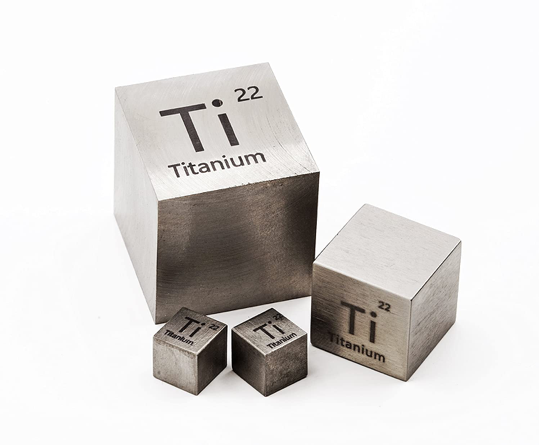
Titanium is the 22nd element on the periodic table and is immediately recognizable for its lustrous, metallic-white color.
The Science
Let’s begin with a science/history lesson on that most wonderous of metals, titanium. Unlike steel, which is an alloy made chiefly of iron and carbon, titanium is an element on the periodic table. It has an atomic number of 22, meaning that a titanium atom contains 22 protons in its nucleus.
Though it shares many chemical properties with other metals like iron and aluminum, titanium stands out from the pack in several important ways. First, it possesses a fantastic strength-to-weight ratio. Because titanium has only 22 protons (compared to iron’s 26), its atoms are relatively lightweight. Moreover, due to how electrons are distributed inside the atom, relatively few titanium atoms can be packed into a fixed volume. Both of these factors grant titanium an exceptionally low density, especially relative to its strength.
Titanium also exhibits great resistance to corrosion and an unusually high melting point. Though titanium does oxidize (rust) in the air, when it does so it forms a protective oxide coating on its surface that drastically slows the oxidation process. Its high melting point results from exceptionally strong intermolecular forces that keep titanium ions firmly lodged in a cloud of delocalized electrons.
CLICK HERE FOR A VIDEO EXPLANATION ON FACTS AND COMMON MISCONCEPTIONS ABOUT TITANIUM
Contrary to popular belief, titanium is not difficult to machine. This myth most likely comes from early manufacturers who simply didn’t know how to work with the metal. Titanium is more malleable than steel and can be heat cut and water cut, chipped, dented, and bent like other metals commonly used in manufacturing. If you just use low cutting speeds, high travel speeds, and stick to sharp and unworn tools, titanium is more than capable of being made into any number of products.
Sources: Mr. Titanium.
The History
First discovered in 1791 by William Gregor, a British clergyman and mineralogist (interesting combination!), titanium initially went by the rather uncatchy name of menaccanite. Gregor named it after its place of discovery: Manaccan, a tiny, far-flung parish on the Lizard Peninsula in Cornwall, England.

William Gregor, discoverer of menaccanite AKA titanium. Source: World of Chemicals.
Later that year, the German chemist Martin Heinrich Klaproth renamed the metal titanium after the Titans of Greek mythology. The Titans were the gods that, according to myth, predated the Olympian gods such as Zeus, Hera, Poseidon, etc. (Fun fact: the planet Saturn also takes its name from the Titans, specifically Cronus, whose Roman equivalent was Saturn, father of Jupiter/Zeus.) Klaproth recognized the natural strength of titanium and picked a badass name to match. Perhaps Klaproth also viewed titanium as a ‘father’ to other metals—and thus in some sense superior to them—much as Cronus was the father of Zeus. Either way, titanium lived up to its new name and was quickly incorporated into a wide variety of engineering and manufacturing processes.
Sources: Oxford Dictionary of National Biography; Machining Difficult-to-Cut Materials (p. 57).
Okay, but How Does This Effect a Car Exhaust System?
Well, the stuff about its discovery and mythology doesn’t really matter. We just thought it was cool.
Check prices on eBay Motors
First and foremost, titanium is about 45% lighter than steel. With a density of 4.51 g/cm3 compared to steel’s 7.8 g/cm3, titanium boasts the highest strength-to-weight ratio of any metal, whether element or alloy.
It is a common misconception that titanium is the strongest of all metals. In fact, steel is stronger and harder than titanium overall. It possesses a higher modulus of elasticity (how much it resists bending and warping) and greater scratch resistance. This is why steel is used for the parts of the car that bear weight, such as the axles, and why many manufacturing processes continue to use steel components.
The main takeaway here is simple: for its weight, titanium is by far the strongest metal out there. Titanium exhausts can easily match the strength of comparable steel parts at a dramatically reduced weight. For this reason, titanium is treasured in the racing community, where every ounce counts. The reduced weight improves the handling, acceleration, and overall performance of the vehicle.
Because of their reduced weight, titanium exhaust tubing systems produce a distinct note wholly apart from typical steel exhaust tones. It has been described as an exotics kind of “aggressive, raspy, and metallic” sound. Put simply, a titanium exhaust system tone is the battle cry of a top-quality race car.
CLICK HERE FOR A VIDEO DEMONSTATING THE SOUNDS OF TITANIUM AND STEEL EXHAUSTS
Two other interesting properties of titanium are its durability and heat resistance. Titanium is highly resistant to corrosion, stains, and rust. This, along with its reduced weight, allows titanium exhausts to generally outlive comparable steel exhaust systems. Further, titanium dissipates heat more effectively than steel and cool almost instantly. This saves the exhaust from warping under intense heat and further extends it lifespan. This is an especially big plus for motorcyclists, as it will save them from burning themselves climbing on or off their bikes.
Finally, we would be remiss not to mention titanium’s aesthetic appeal. While stainless steel exhausts typically come either polished or in a dull silver color, titanium positively radiates with shades of gold, bronze, purple, and azure.
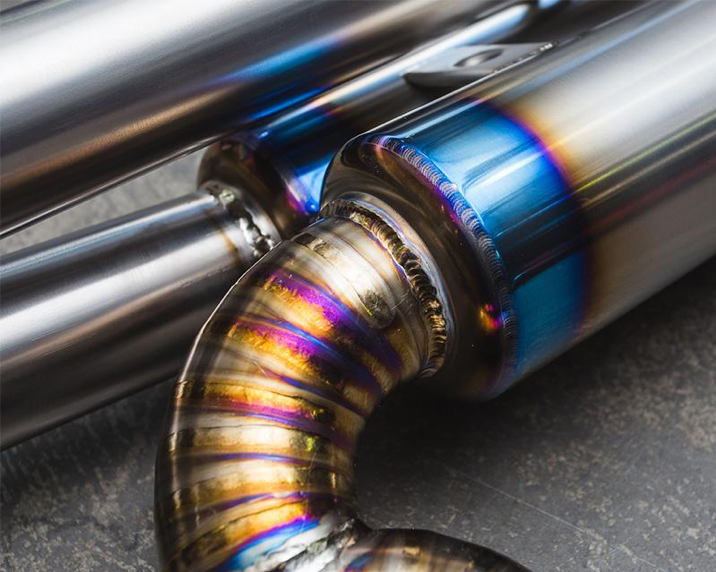
A titanium exhaust: light, powerful, and colorful. Source: KillFab.
Because of their steep price and extremely fine tuning, most titanium exhaust systems are built made-to-order for specific vehicles. These are most certainly not off-the-shelf products.
The remainder of this article will go over some of the best producers of titanium exhaust systems. We will also look at titanium exhaust tips that serve as silencers to dampen the noise level of a factory exhaust.
RYFT

Titanium Race Exhaust with Tips
RYFT is a relatively new company that makes aftermarket titanium exhausts for the cream-of-the-crop sports cars: Ferrari, Lamborghini, McLaren, and Porsche. RYFT provides low product run, high quality exhaust systems, and their exhaust systems are 100% hand built. Compared to stock exhausts, they are about 45 lbs. lighter and provide a 12.7 boost in horsepower and 17.3 boost in torque. Coolest of all, they include a special “Velocity Loop” design that generates a distinctly loud and clean exhaust note quite different from other exhaust systems, titanium or otherwise.
Check prices on eBay Motors
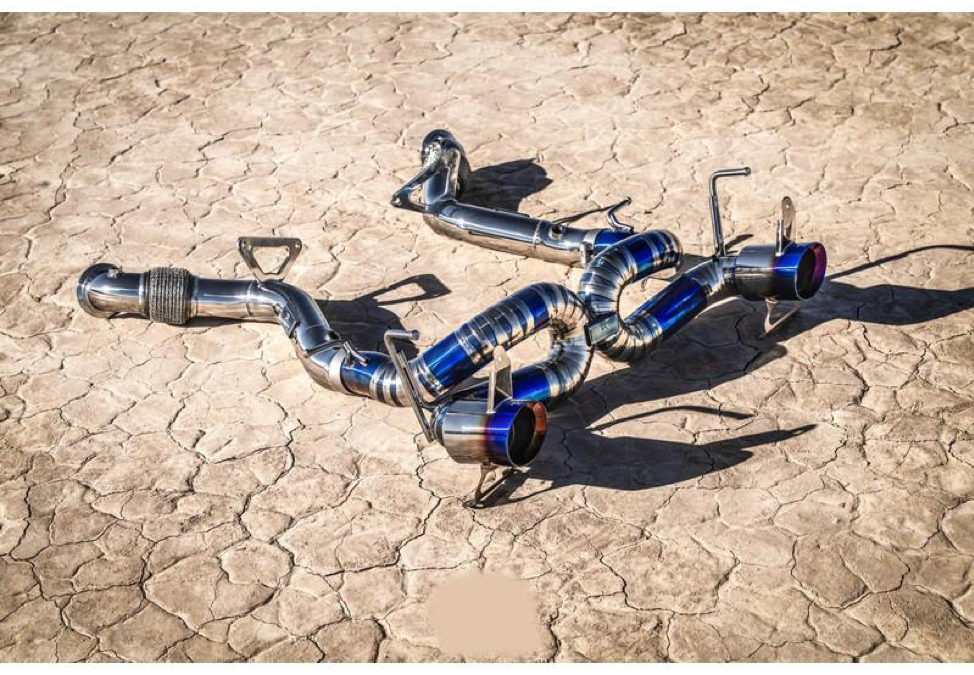
The RYFT Titanium exhaust with Titanium exhaust tips for Ferrari Pista. Each system is hand-made for a specific car. Source: AutoTalent.
We spoke to Jordan Shiraki, one of the founders of RYFT. “Everything we do is engineered around sound first,” Jordan told us. “All these other exhaust companies are trying to squeeze the most power out of their systems […] and I made the executive decision that, instead of going for power only, we are tuning for sound.” While “we sacrificed a bit of power for sound,” Jordan pointed out that “it’s such a small amount of horsepower that we lose, and honestly the person driving it can’t feel that 5 or 10 HP difference.” However, “what is much more tangible to them is the sound.”
Jordan also told us a bit about the technical specifications of the RYFT exhaust systems. “We do pie cuts, which are individual little cylinders that are hand-welded together to form each of those strips” you see in the images. “A lot of our systems have over 100 individual pieces of titanium.” He noted that RYFT exhausts use both autogenous welds, which are really smooth and feel like they’ve been grinded down, and fillet welds. Autogenous welds involve melting two pieces of titanium together to form a seam and are commonly used in aerospace engineering.
Jordan concluded by noting his history with Lamborghini. “I’ve worked with Lamborghini for 10 years, and I rely heavily on my friends there for the design and engineering of all these products.”
Be aware that RYFT produces their exhausts in very small production runs. They are quite exclusive and may be hard to come by no matter how much cash you have to burn. For example, this system for Ferrari 488 runs at $7,000. But, for the exotic car owner who wants tip-top performance and style, RYFT is the crown jewel of exhaust systems.
Check prices on eBay Motors
Source: RYFT; AutoTalent.; phone interview conducted with Jordan Shiraki (06/05/2020).
Ti-Tek: Titanium Specialists

Ti-Tek is a British company that, as its name suggests, is the go-to source for all your titanium needs. Founded in 2010 with a strong focus on titanium exhausts and accessories alongside carbon fiber parts, Ti-Tek has since handled research and development for many exhausts and exhaust accessories. Ti-Tek offers a wide range of titanium exhausts for both cars and motorcycles. Click here to make an inquiry about getting a Ti-Tek exhaust fitted for your vehicle.
Most notably, they produce the KS TI-1.2 ASNEX titanium that is used in many exhaust systems. Ti-Tek has invested in a £120,000 fiber tube laser cutting machine that can cut metals to exact shape and size. Tube laser cutting allows metal to be quickly cut and reshaped in nearly any way imaginable without any loss in accuracy or precision. They use this tech to supply titanium for all kinds of auto parts such as the vehicle body, chassis, and engine parts.
Ti-Tek Titanium Race Exhaust
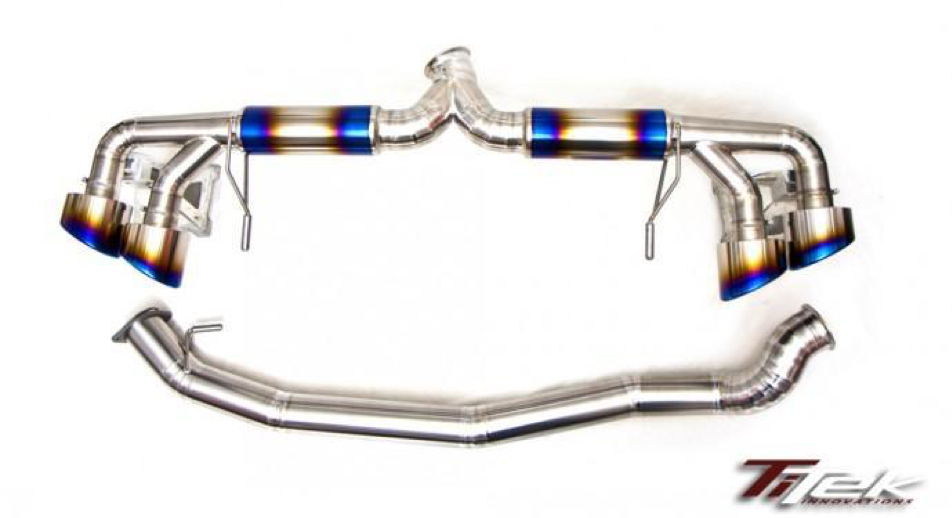
The Ti-Tek Titanium 90mm Race Exhaust tubing and tips for Nissan R35 GT-R. Source: SP Engineering.
Pictured above is Ti-Tek’s titanium race exhaust for the Nissan R35 GT-R. It features a 90-mm center pipe that splits into two 76-mm piping and vented burnt tips. For all that, the total weight is only 19 lbs. This exhaust will turbocharge horsepower by maximizing exhaust flow and can be easily bolted on. Note that this exhaust is for off road racing use only.
Ti-Tek can provide a full titanium exhaust tubing and tips system for your Lamborghini Murcielago, LP570, LP560, Huracan, Avendator, among other models. As far as Ferraris go, they have options for the 458, 575, and 599. These systems will run upwards of $7,000, with the system for the Avendator hitting $8,099. Ti-Tek exhaust systems for Nissan, McLaren, and other makes are slightly more reasonably priced, but will still run several thousand dollars on average.
Buy from SP Engineering: $3,699
Check prices on eBay Motors
Ti-Tek Titanium Race Tips
Ti-Tek also makes optional titanium race tips that can be used with an existing Nissan GT-R exhaust. Simply replace the factory tips with these Ti-Tek exhaust tips and get many of the benefits of a full titanium exhaust system at a fraction of the cost and with a much easier installation. Like all Ti-Tek products, these are made to order and require 6–8 weeks for production.
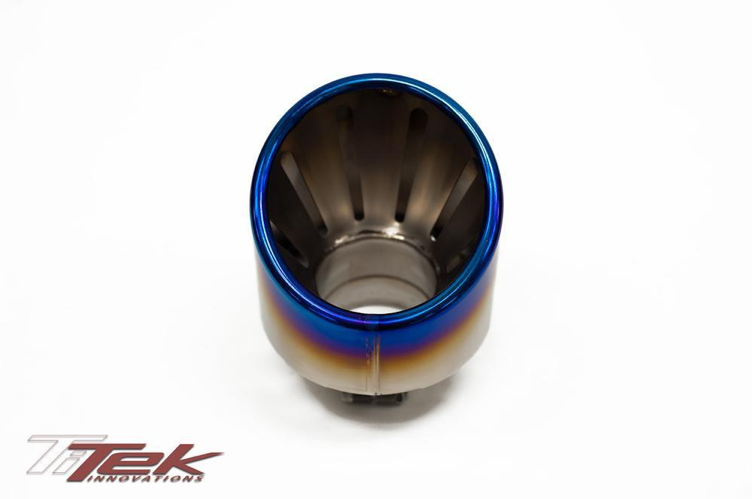
The Ti-Tek titanium race tip for Nissan R35 GT-R. Source: SP Engineering.
Check prices on eBay Motors
Source: Ti-Tek; SP Engineering.
Soul Performance

Titanium Race Exhaust System for Lamborghini Huracan Performante
This system from Soul Performance will fit any 2017–2019 Lamborghini Huracan Performante LP640. According to Paul from Soul Performance, this system “sheds 38 lbs. so it is lighter [than the factory exhaust on the Performante], and we use 3” piping which helps with exhaust flow and creates more low-end torque.” This pushes the Lamborghini’s already stellar handling, braking, and acceleration to the absolute pinnacle of perfection.
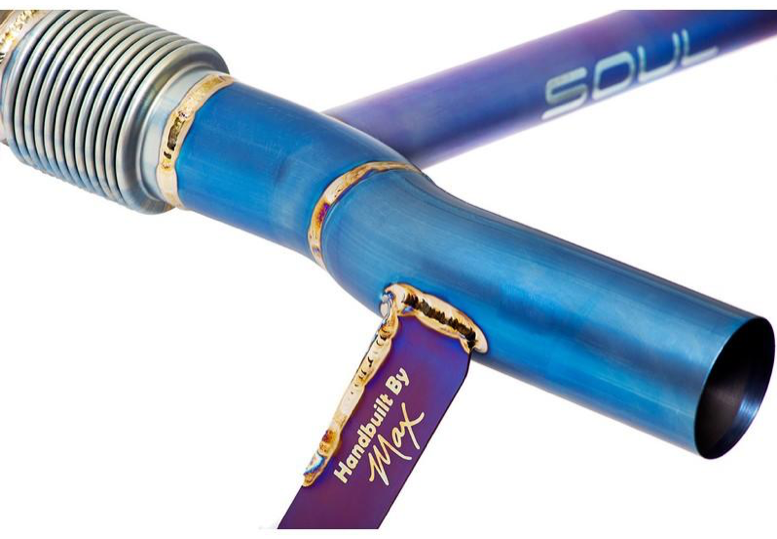
This raw titanium exhaust from Soul Performance is positively radiant in its colors.
Paul told us how you can get this system with either raw titanium or anodized finish. The difference is purely aesthetic: only the raw finish will display those magnificent blue colors. “Most people get raw,” Paul added, without really needing to explain why.
Each is made from mandrel-bent 0.039” wall titanium tubing, CNC machined flanges, and laser cut brackets. All welds are back purged for maximum durability and strength, and a hand-anodized finish is also an option for even more style and flair. Like all Soul Performance products, this exhaust system is backed by their lifetime warranty for both street and track use.
CLICK HERE FOR A VIDEO DEMONSTRATION OF THE SOUL PERFORMANCE TITANIUM RACE EXHAUST
Buy from Soul Performance: $3,595 (contact them directly for a $180 retail discount)
Check prices on eBay Motors
Sources: Soul Performance; AutoTalent; interview conducted with representative from Soul Performance (06/05/2020).
JCR Performance

Titanium Race Silenced Exhaust Tips With Downturn
You may also wish to consider these silencing exhaust tips. They can be fit onto any 991 GT-based cars and any center exhaust section that uses a 3-bolt flange arrangement.
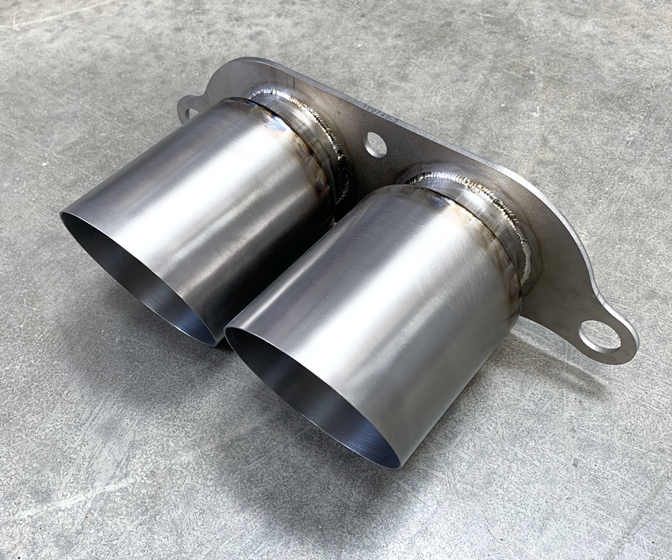
Straight titanium exhaust tips from JCR Development. Source: JCR.
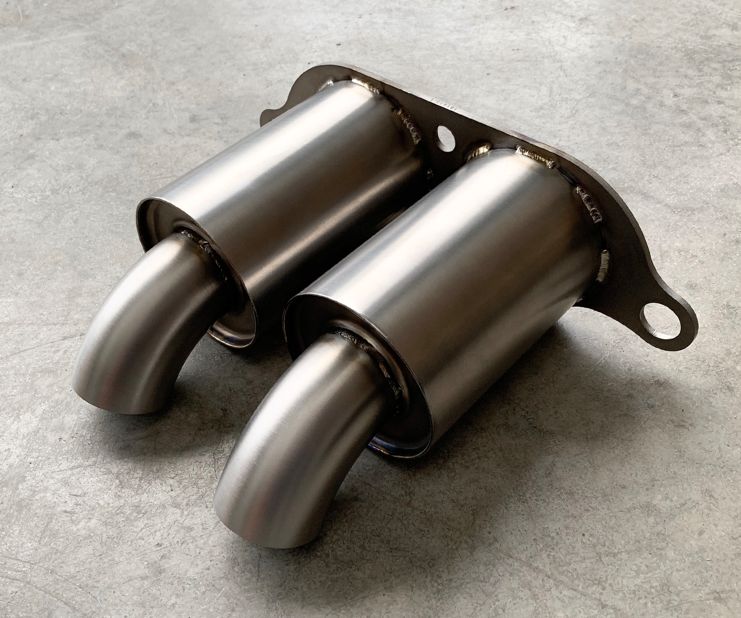
Curved exhaust tips from JCR.
Their purpose is to significantly cut exhaust volume. Tests have shown that these tips led to a reduction of 4–5 dB depending on the track and weather conditions. If you brought your car to the track only to find that the noise level of your exhaust during the drive-by noise test turned out way higher than expected, these things can be installed quickly and easily on site.
Buy from JCR: £1,195 (about $1,476)
Check prices on eBay Motors
Source: JCR.

